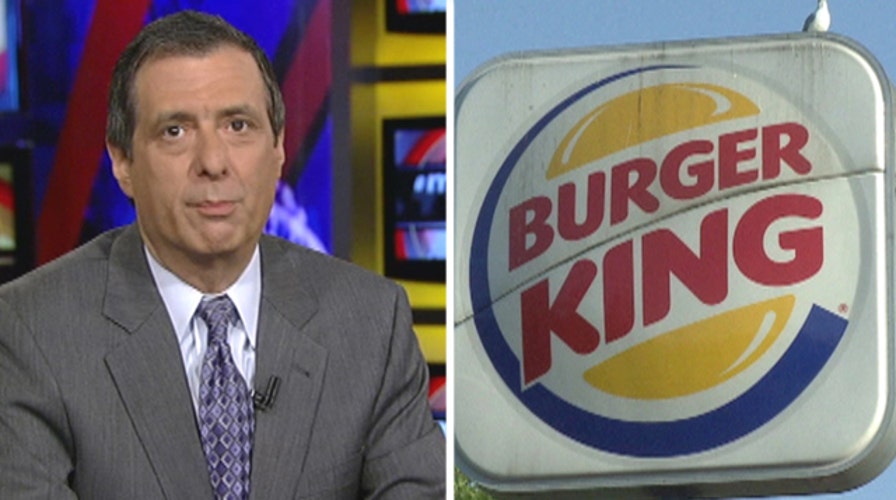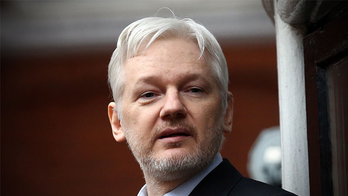Kurtz on Burger King: Media wake up to corporate chicanry
It takes a whopper of a story for press to cover tax inversions
I feel confident in saying that most Americans are disgusted by the perfectly legal practice of U.S. companies avoiding taxes by incorporating in another country.
So why does it take a whopper of a story to get the media to pay attention?
Burger King, as you know, is moving to buy the Canadian chain Tim Hortons, and this is more about dollars than doughnuts. The hamburger giant plans to move its headquarters to Canada, thereby slashing its Treasury tax bill.
The White House doesn’t like it. Democrats don’t like it. The Republicans don’t like it. And, as usual, it doesn’t look like Washington will do anything about it.
Sure, Burger King is an iconic brand whose $11.4-billion move to gobble up Canada’s version of Dunkin’ Donuts would undoubtedly seize the media spotlight. And every two-bit wag gets to say that Burger King execs are “having it their way,” leaving American taxpayers with indigestion.
But 70 U.S. companies have engaged in similar maneuvers, known by the stupefyingly boring name of “inversions,” and the media have collectively yawned, relegating the debate to the inside business pages. There was a brief blip when the daughter of Sen. Joe Manchin, the CEO of a generic drug company, moved to incorporate in the Netherlands, although her father wants to outlaw such moves.
Why have journalists and commentators failed to bang the drum over this outrage?
And will this nose-thumbing decision by the country’s No. 2 burger chain, after McDonald’s, turn this into more than a two-day story?
Turns out the two parties are using the issue to rehash a tired debate over tax reform, rather than try to close this glaring loophole. Analysts say the chance of legislation passing is virtually zero.
The Democrats are focusing on stopping what they depict as unpatriotic corporations from using what is essentially a giant accounting gimmick to slash their tax bills. The Republicans are focusing on the high level of U.S. corporate taxes, which they say makes this country increasingly uncompetitive.
In the case of Burger King, the company will pay a 15 percent rate on its Canadian operations, as opposed to the American rate of 35 percent. (President Obama has repeatedly proposed lowering the corporate tax rate to 28 percent.)
Both sides have a point—but compromise, as usual, is out of the question. So add the loophole to the long list of issues that your nation’s capital would rather talk about than solve.
As Politico says, “The impotent Washington response to losing an iconic American fast food company over a tax issue is a reflection of just how dysfunctional Congress has become — and a stark illustration of how far apart the two parties are on tax reform.”
Burger King claims it won’t get much of a tax break because it will continue paying taxes on its U.S. profits at the same rate. But Slate says that “seems transparently untrue…Canadian citizenship will likely give it more opportunities to use various accounting and business tricks to shift profits north of the border and out of the reach of the IRS (multinationals with foreign subsidiaries excel at that sort of thing).”
Republicans don’t seem that exercised. According to The Hill, “GOP aides on Capitol Hill acknowledged that adding a prominent brand like Burger King would bring more attention to the cross-border deals. But they said they wanted to see more details about the possible merger before commenting on how much more pressure lawmakers would face on inversions.”
Translation: We’ll get back to you, sometime.
And then there is the Warren Buffett factor. The zillionaire investor practically became a spokesman for Obama’s tax reform by complaining that his secretary pays taxes at a higher rate than he does. But his Berkshire Hathaway is helping to finance this deal.
New York’s Daily News seethes with populist outrage:
“President Obama’s favorite billionaire has thrown him under the Burger King bus.
Warren Buffett stuck one of his big Midas thumbs in Obama’s eye Tuesday by agreeing to pony-up $3 billion so the hamburger chain can buy a Canadian doughnut outfit — and avoid paying millions in U.S. corporate taxes by moving part of its headquarters to Ontario.
“Buffett made the move just a month after Obama denounced ‘inversion’ tactics like this as an ‘unpatriotic tax loophole’ and ordered regulatory changes to curb them.”
In fairness to Buffett, while he has crusaded for tax changes, he is a businessman who can’t be expected to play by different rules until the laws are changed.
I guess it takes something like this fast-food furor to force the media to take on a complicated topic, just as a celebrity death spawns a spate of stories about drug addiction or depression. But this really shouldn’t need extra ketchup to be a spicy story. As Politico notes, 47 companies have shifted headquarters abroad in the past decade at least partly for tax reasons, which the Congressional Research Service says is more than a 60 percent increase from the previous 20 years.
But I doubt the media have a voracious appetite for this story with no partisan slugfest taking shape on the Hill. There are already signs that we’ve moved on to the flap over Arby’s “Monster Meat” sandwich while Burger King gets ready to complete its Canadian conquest.





